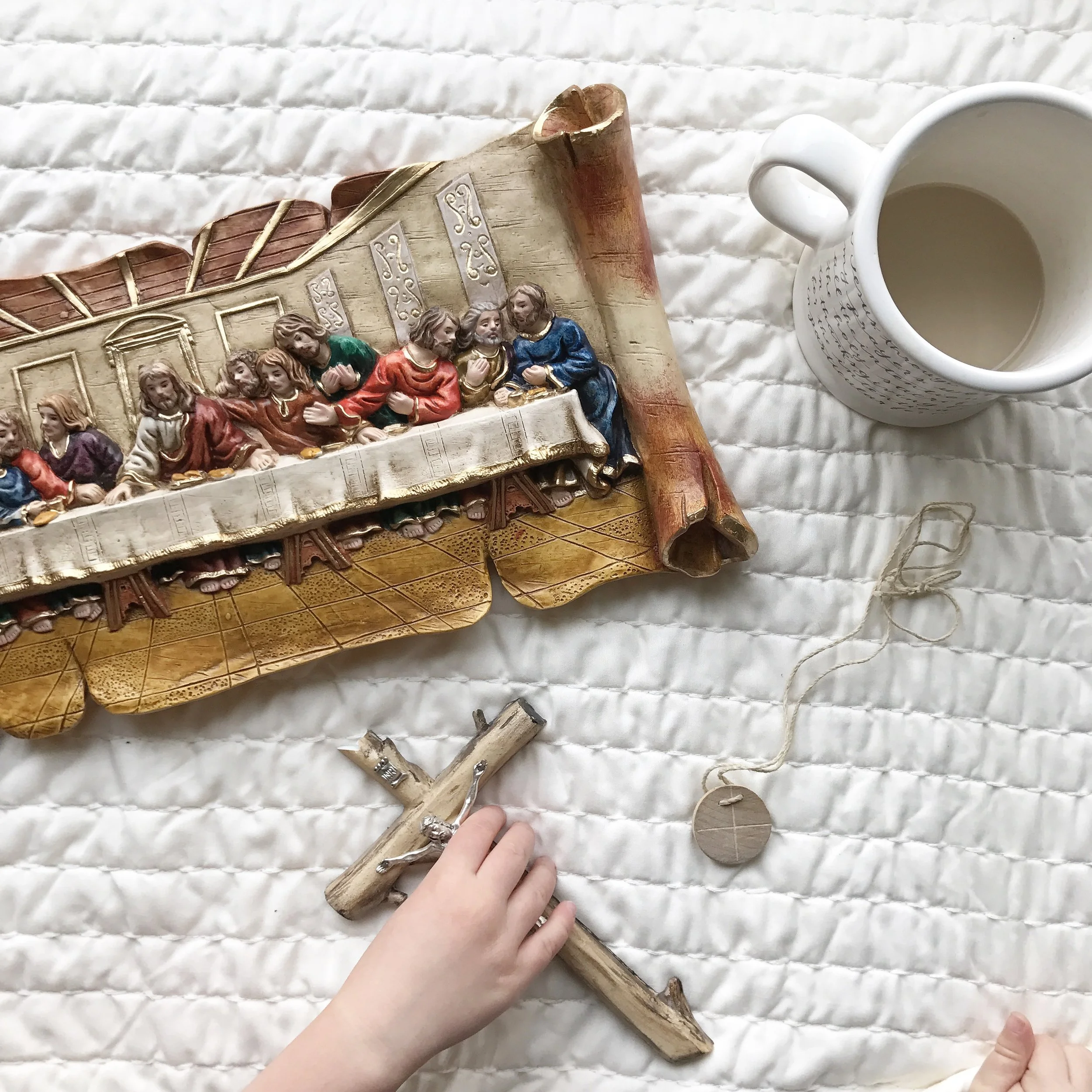On This Holy Thursday: The Eucharist and Lembas (Triduum Series)
On this Holy Thursday, Catholics celebrate Christ’s institution of the Eucharist, or the Last Supper as it is commonly referred to. Tolkien himself held a strong devotion to the Blessed Sacrament, which Catholics believe to be the body, blood, soul, and divinity of Our Lord Jesus Christ. Tolkien spoke of the Eucharist many times throughout his Letters.
In honor of this blessed Holy Thursday, I wanted spend a bit of time today in reflection on the Eucharist. And as this is a community inspired by the life and works of Tolkien, it felt appropriate to look at the influence of the Eucharist on Tolkien's life, his letters, and his fictional works.
Brought Up in Faith
Tolkien's mother was welcomed into the Roman Catholic Church in 1900, although it meant an end to all financial assistance from her family who had been strongly opposed to her conversion.
The small family lived on the borders of poverty until 1904, when his mother passed away due to acute diabetes. In Tolkien's eyes, his mother had sacrificed everything, including her own life, for the sake of the spiritual well-being of her children. He wrote, "My own dear mother was a martyr indeed, and it is not to everybody that God grants so easy a way to his great gifts as he did to Hilary and myself, giving us a mother who killed herself with labour and trouble to ensure us keeping the faith."
After the brothers were orphaned, they were cared for in large part by their mother's chosen guardian and parish priest Father Francis Morgan. Tolkien continued to grow in the faith, attending and serving in daily Mass often and developing a devotion to the Eucharist.
Lembas, Bread of Life
The influence of the Eucharist flowed, subconsciously at first, into his writing. In The Lord of the Rings, we experience it most plainly in the Elvish way bread, Lembas.
A parallel casually overlooked before my conversion, yet now unmistakable as a Catholic, the elvish Lembas bread is perhaps the most distinctly Catholic element of The Lord of the Rings. (But of course it is the most distinctly Catholic element of Catholicism as well.)
The elvish Lembas bread is a gift, given by the Elves to the fellowship, but also by Tolkien to his readers. Through its illustration --particularly the role it plays in the lives of our beloved hobbits-- we begin to recognize the Sacrament of the Eucharist in Middle-Earth.
Lembas, like the Eucharist, is life-sustaining. For most, this is in a spiritual sense (although miraculous 'Eucharistic fasts' have been reported, during which a person was sustained by consuming the Eucharist alone, such as the story of Alexandrina Maria de Costa). As we participate in the Sacrifice of the Holy Mass, we encounter the living Christ and are sustained by the graces of receiving Him in his true presence.
Lembas is as much spiritual food as it is physical food. Lembas brings strength to the body and nourishes the spirit; it 'is more strengthening than any food made by man... One will keep a traveller on his feet for a day of long labour," (The Fellowship of the Ring, Farewell to Lorien).
"The lembas had a virtue without which they would long ago have lain down to die. It did not satisfy desire, and at times Sam’s mind was filled with the memories of food, and the longing for simple bread and meats. And yet, this way bread of the Elves had potency that increased as travelers relied upon it alone and did not mingle it with other foods. It fed the will, and it gave strength to endure, and to master sinew and limb beyond the measure of mortal kind," (The Return of the King, Mount Doom).
In His Letters
Two excerpts from his letters stood out as I reflected on the Eucharist this afternoon...
"Out of the darkness of my life, so much frustrated, I put before you the one great thing to love on earth: the Blessed Sacrament. . . . There you will find romance, glory, honour, fidelity, and the true way of all your loves on earth, and more than that: Death.
"By the divine paradox, that which ends life, and demands the surrender of all, and yet by the taste—or foretaste—of which alone can what you seek in your earthly relationships (love, faithfulness, joy) be maintained, or take on that complexion of reality, of eternal endurance, which every man’s heart desires.
"The only cure for sagging or fainting faith is Communion. Though always itself, perfect and complete and inviolate, the Blessed Sacrament does not operate completely and once for all in any of us. Like the act of Faith it must be continuous and grow by exercise." - Letters, 219
On This Holy Thursday
And so as we honor this blessed day, as we reflect on the Christ's institution of the Blessed Sacrament, I pray that we may be encouraged by Tolkien's devotion to Our Lord as it shines through his works. May we receive the Holy Eucharist as often as possible, with an eager spirit. May we seek it more than any other thing on this earth, for as Christ is truly present in the bread and wine, it truly is "the greatest thing to love on earth."
You Might also like...
This article has been a part of our three-part series on Triduum 2017.
You can read through the whole series here:






